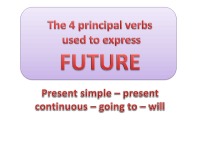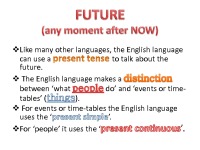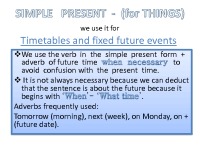The 4 Principal Verbs Used To Express Future Slides



The 4 principal verbs. Used to express. Future. Future. (any moment after nowSimple present - (for thingsWe use it for. Timetables and fixed future events. Simple present - (for thingsPresent continuous – ( for peopleFuture arrangements – planned actions. Present continuous – ( for peoplePresent simple – present continuous. To be going to. WILL. Helps other verbs to express FUTURE. Will.
The 4 principal verbs used to express FUTURE.
Present simple – present continuous – going to – will.
Like many other languages, the English language can use a present tense to talk about the future. The English language makes a distinction between ‘what people do’ and ‘events or time-tables’ (things). For events or time-tables the English language uses the ‘present simple’. For ‘people’ it uses the ‘present continuous’.
SIMPLE PRESENT - (for THINGS) we use it forTimetables and fixed future events.
We use the verb in the simple present form + adverb of future time when necessary to avoid confusion with the present time. It is not always necessary because we can deduct that the sentence is about the future because it begins with ‘When’- ‘What time’. Adverbs frequently used: Tomorrow (morning), next (week), on Monday, on + (future date).
Excuse me, does this train leave for Manchester at 7.30 ?
No, this one leaves for London in five minutes’ time. The train to Manchester leaves from Platform 2 at 7.30.
What time does the next train for Hull leave? It leaves at 10.15 a.m. When does school start? It doesn’t start until September. Are the shops open tomorrow? Yes, they open at 9 a.m. and close at 6 p.m. Is there a meeting next Wednesday? Yes, it starts at 3 p.m. Don’t be late!
- Languages Presentations
- MS PowerPoint 995 KB
- 2020 m.
- English
- 30 pages (1427 words)
- School
- August

















